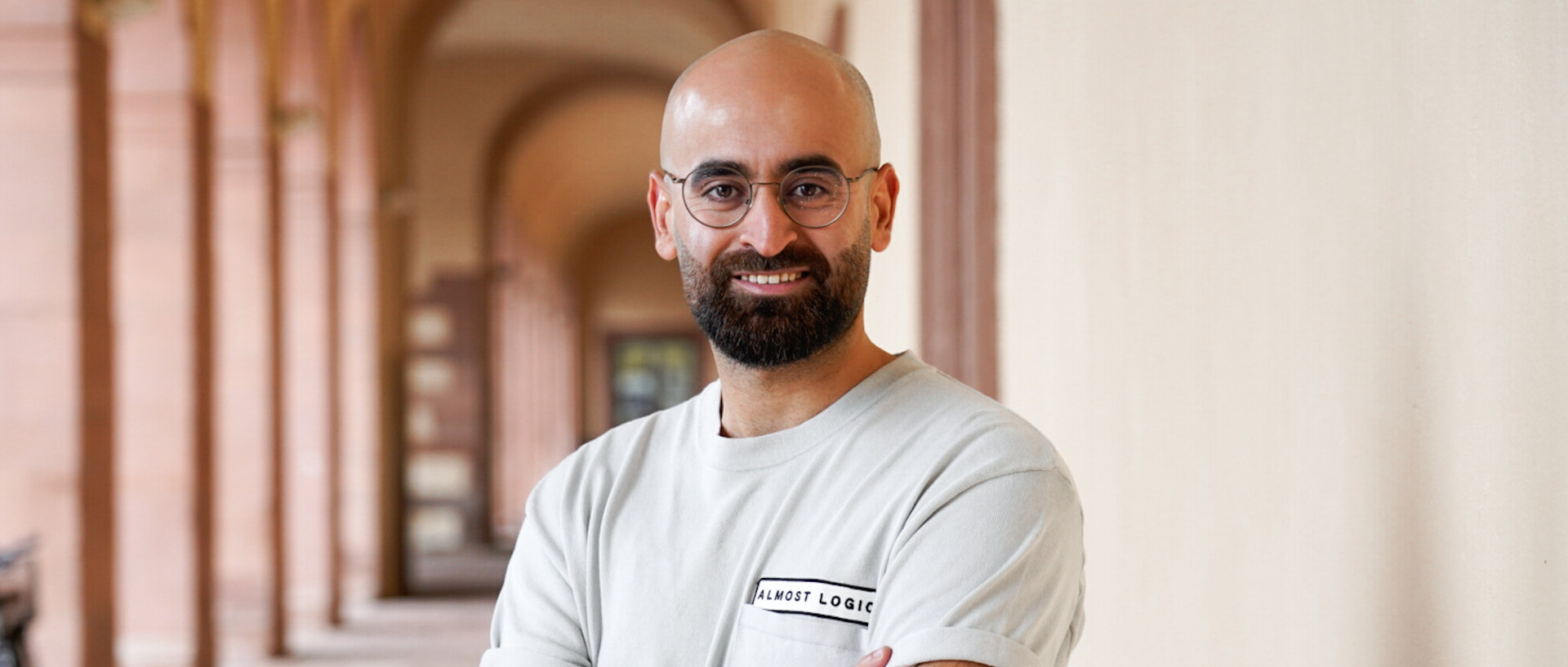“It has always been my goal to continue my studies in psychology that I had started in Syria”
Abdolaziz Hassan is 28 years old and comes from Qamishlo, a small city in north-eastern Syria. In 2015, he had to leave his home and came to Germany as a refugee. He was sure of one thing: to continue to study psychology. Today, he is close to completing his bachelor’s degree. In our myUniMA story, he talks about the differences between the psychology programs in Mannheim and Syria and what he appreciates about studying in Mannheim.
You are close to finishing your degree in psychology. How does that feel?
Even when I was in secondary school, I enjoyed working with people. In the first month of my degree program in psychology, I already knew that it is the right fit for me. At first, I started to pursue a degree at the University of Aleppo. Due to the war, I had to transfer to the Tischreen University in Latakia. However, I could not complete the degree program since I had to leave the country. There was a war, I would have had to serve in the military, and I did not have an academic perspective in my home country. In mid-2015, I arrived in Germany. At the beginning, life in Germany was very difficult for me: a new country, a new language, and a foreign culture. However, it always has been my goal to continue my studies and to finish what I have started in Syria. My plan worked out well and I am very proud of that!
How did you manage to learn German in such a short amount of time and so well that you were able to complete a degree taught in German?
At the beginning of 2016, I was awarded a scholarship for a German language course at the University of Mannheim. The German language course was very intensive and exhausting but it also was the perfect preparation for my studies. After I had passed the final examination, I was able to apply for a degree program at the University of Mannheim. I was very happy to be accepted! This was a huge relief, since I already knew my way around campus and I felt at home in Mannheim. Who doesn’t want to study in a palace? (laughs)
Did you notice any differences between studying in Syria and in Mannheim?
I guess this is the question I get asked the most from my fellow students (laughs). There are many similarities – some of the coursework and examinations from my program in Syria have been recognized by the University of Mannheim. Nevertheless, I noticed a huge difference: My program in Syria focused on theory and textbooks. Unfortunately, the curriculum often did not include current issues. At the University of Mannheim, the latest topics are included in the classes and the teachers always try to teach us the latest research findings. In my opinion, this is really interesting and important! I was also pleased to discover the importance of psychology in Germany. In Syria, this is different, and people tend to underestimate this field.
What was particularly challenging about the degree program at the University of Mannheim?
At the beginning, I struggled with the German language. Also, the examination system is different from the system in Syria. However, I was able to catch up on everything, with the help of my best friends. I met them here at university. Without their mental support and the help from my family in Syria, it would have been much more difficult. I am really very grateful for this help. I am also grateful to all the people in Germany who motivated me and were always there for me.
What are the most beautiful memories you have made at the University of Mannheim?
The friendships I’ve made at university will last. This is the best thing about my studies. I am also very happy with my program and I feel well prepared since I have already been able to put my theoretical knowledge to work: I have done two internships at the Central Institute of Mental Health (ZI) in Mannheim. Currently, I am a student assistant in the research group “Systems Neuroscience in Psychiatry” (SNiP). This is great fun! Due to the Covid-19 pandemic, we could only take virtual classes in the last two semesters. This is unfortunate, but there is nothing we can do about that, it had to be this way.
What do you do in your spare time?
To me, sport is the most important activity. I am very active. When I came to Mannheim, I started to play soccer right away, although I hardly spoke any German. This way, I got to know many nice people and I am still playing at a club at Lindenhof. Besides that, Mannheim has a lot to offer and the city has many beautiful corners. I am a runner and love to run at the Rhine or the Neckar. I also like visiting the Quadrate. They remind me of my hometown that had a similar system.
Do you already know what you want to do after you graduate?
I am firmly set on earning a master's degree in psychology with a focus on clinical psychology. I already applied to some master's programs in Germany, but Mannheim would be my first choice. My goal is to become a therapist. Unfortunately, the education system in Germany is rather complicated and very expensive. But the first step is earning a master’s degree, then we will see.
What advice would you like to give to other international students?
The University of Mannheim is very international and supports international students very well. At the beginning, it may be difficult, but you have to push through If you have a goal, you will reach it. There is nothing you can’t achieve at the University of Mannheim!
Text: Sarah Kempe / July 2021
